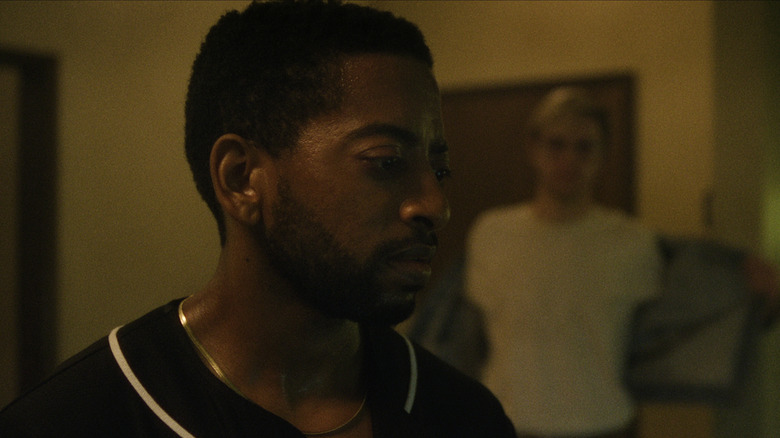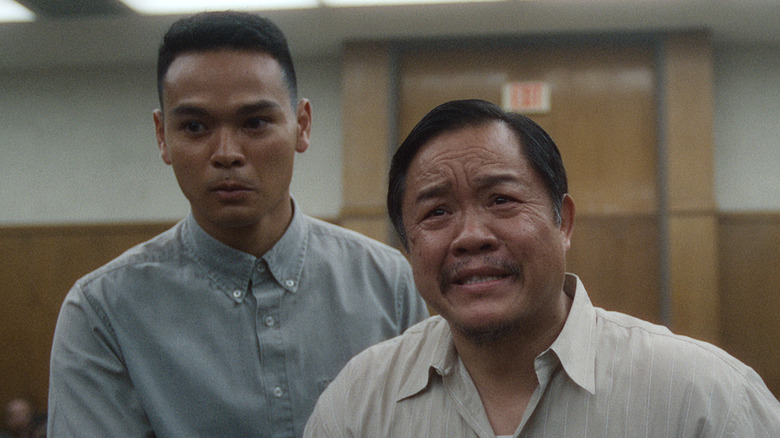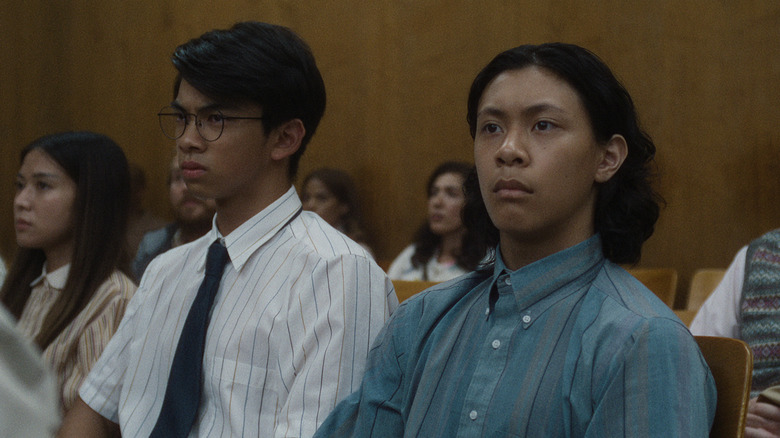Ron Goldman's Sister Kim Did Not Hold Back Her Criticisms Of Monster: The Jeffrey Dahmer Story
Netflix's "Dahmer – Monster: The Jeffrey Dahmer Story" has generated a lot of backlash and controversy due to the show's depiction of events, details from the show's set, and the showrunners' failure to consult the families of victims in the process of creating the show. At the same time, "Monster" smashed a Netflix record by becoming Netflix's biggest debut ever. Even though the true crime genre is extremely popular, several ethical issues arise within this genre, which are not always taken into account by filmmakers.
Because true crime shows are based on actual events, they ideally should not be approached the same way as a completely fictional crime show, such as "Breaking Bad," "Ozark," or "Good Girls." These series are usually focused on the criminals rather than the victims or survivors of their crimes. They may contain humor, unrealistic events, or gratuitous blood and gore. Although these elements may all be part of the entertainment in fictional crime shows, they come across differently when the show is based on true crime.
Kim Goldman is the sister of Ron Goldman, who is believed to have been murdered by O. J. Simpson. She is also a writer and she works in the nonprofit sector on a variety of causes. As someone who is well-versed in the ethics of true crime television and sensationalist news coverage of crimes, Goldman did not mince words in her criticism of "Dahmer – Monster: The Jeffrey Dahmer Story."
Kim Goldman thinks families should be consulted by true crime filmmakers
In an interview with Entertainment Weekly, Kim Goldman discussed several ethical issues with the Netflix show "Dahmer – Monster: The Jeffrey Dahmer Story," as well as other similar true crime projects. Goldman's most fundamental concern was probably the show's failure to consult or even notify families about the show. She added that, unfortunately, this failure to consult families is "par for the course" with true crime series.
Goldman said, "Some article said Netflix is not required to notify the families. And it bugged me! How s***ty is that, that it doesn't even dawn on you from just a human space that you would give someone a courtesy call?" Goldman added that when she and her family heard about Ryan Murphy's FX series "The People v. O. J. Simpson: American Crime Story," they reached out to ask what they could learn, but were allegedly told no. "We asked if we could see an advanced copy — we were told no ... I said, 'Well, that's unfortunate.' It kind of works against you. If you were to at least share it with me, then I would be able to say, 'Hey, they shared it with me, and this is what I feel about it.' Missed opportunity."
Goldman has also discussed the possibility of creating a law requiring filmmakers to consult with families on her podcast. She also speculated as to the reasons why creative teams would not contact families. "I would imagine [it's] because of the pushback that a production company or a network would receive if a family got wind [of a project] and wanted some kind of involvement," she said. "I just don't think that people have often thought about the fact that families are not included in that process."
Kim Goldman thinks a disclaimer for shows that did not consult families could help somewhat
Kim Goldman's issue with "Monster: The Jeffrey Dahmer Story" and similar true crime shows that do not consult families is not just that it shows a lack of courtesy. The other problem with this is that viewers have the expectation from this genre that what they're viewing is a fictionalized but still realistic account of events. A realistic, well-rounded account of events would be difficult to portray without consulting the families of victims.
As a possible partial solution to this, Goldman told Entertainment Weekly, "I think about biographies, you'll see 'unauthorized biography' [on the cover]. That tells me, 'Oh, that probably means that the person who they're writing about doesn't support this or know that this book is being written.' Now I get to take that [book] with a grain of salt. When or if I choose to read that book, now I know the lens with which to view it. I feel like that could be applied to these types of shows, and then people can decide whether to watch it... I'm not trying to stop people from [watching], but just maybe to have a different sensitivity as you consume the show that it wasn't at the pleasure of the victim's family."
A disclosure like this could certainly help viewers at least adapt their viewing lens. Furthermore, if viewers so chose, they could limit their consumption of true crime to shows that actually did consult with victims' families.
Kim Goldman thinks more true crime shows should focus on the victims' perspective
In her interview with Entertainment Weekly, Kim Goldman shared that she asked Jeffrey Toobin, who wrote the book that Netflix's "Dahmer – Monster: The Jeffrey Dahmer Story" was based on, about why family members of Dahmer's victims were not consulted. "He said, 'Well, it wasn't victim-focused.' And I'm like, 'Well, that's the problem.'"
Goldman added, "I think we can change the narrative about the way we tell stories and to make sure that we're telling the stories that include the victimization, and that can allow people to understand that that's part of the process. I think it's changed a little bit over the last couple of years, but most of the shows are from the criminal's perspective, from the law enforcement perspective, from the legal perspective. Very seldom do you often see it from a victim's perspective. It paints a picture that victims and survivors are in the background, you know, in a fetal position on the floor ... It's irresponsible to not in some way include the families so that you can understand what they're experiencing and to give a little bit more power back to them."
Indeed, many true crime series focus on the criminal: their childhood, their background, their psychology, and why they became criminals. While this may provide partial insight into the events that occurred, it does a disservice to families and victims because it erases their experience to focus solely on the perpetrator instead. The victims were just as real and important as the serial killer who committed these crimes that ended many lives and forever altered countless others. Kim Goldman thinks it is time to shift the perspective to the foreground, or at least include that of victims and families.



